关于惊蛰的英语作文范文800字带翻译
惊蛰,作文,自己醒了

惊蛰,作文,自己醒了英文回答:As I woke up, I could feel a strange energy in the air. It was as if nature was awakening from its long winter slumber. The birds were chirping louder than usual, and the sun seemed to shine brighter. I realized that it was the day of "Jingzhe", also known as "Awakening of Insects" in English.Jingzhe is the third solar term of the traditional Chinese calendar, marking the transition from winter to spring. It is believed that on this day, insects start to awaken from their hibernation and birds begin to search for food. It signifies the arrival of warmer weather and the start of a new agricultural season.I couldn't help but feel excited about the arrival of spring. It reminded me of the saying, "Spring is the time of plans and projects." It's a time when people startmaking plans for the year ahead, whether it's planting crops, starting a new business, or embarking on a new adventure. It's a time of renewal and growth.One of the things I love about this season is the blooming of flowers. Just like the saying goes, "April showers bring May flowers." It's amazing to see how the barren landscape transforms into a colorful and vibrant one. The sight of cherry blossoms in full bloom is truly a feast for the eyes.Another thing that comes to mind when I think of spring is the tradition of spring cleaning. It's a time whenpeople clean their homes from top to bottom, getting rid of the clutter and making space for new things. It's like a fresh start, both physically and mentally.中文回答:当我醒来的时候,我能感觉到空气中有一种奇怪的能量。
有关惊蛰的英语作文
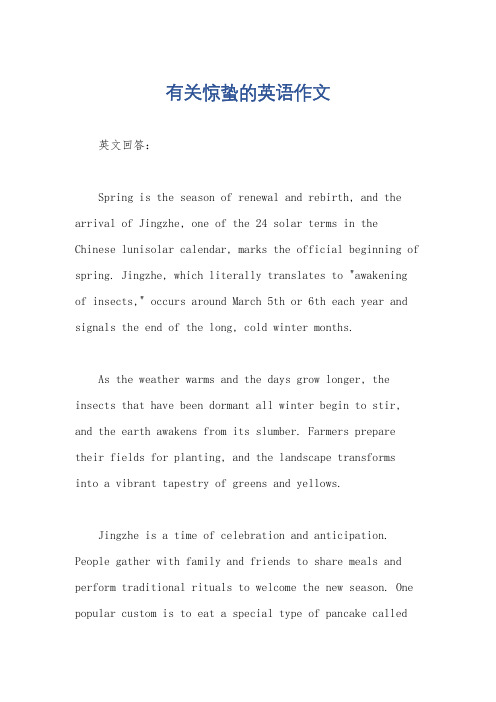
有关惊蛰的英语作文英文回答:Spring is the season of renewal and rebirth, and the arrival of Jingzhe, one of the 24 solar terms in the Chinese lunisolar calendar, marks the official beginning of spring. Jingzhe, which literally translates to "awakening of insects," occurs around March 5th or 6th each year and signals the end of the long, cold winter months.As the weather warms and the days grow longer, the insects that have been dormant all winter begin to stir, and the earth awakens from its slumber. Farmers prepare their fields for planting, and the landscape transformsinto a vibrant tapestry of greens and yellows.Jingzhe is a time of celebration and anticipation. People gather with family and friends to share meals and perform traditional rituals to welcome the new season. One popular custom is to eat a special type of pancake called"chunbing," which symbolizes the coming of spring.In addition to its cultural significance, Jingzhe also has important agricultural implications. The arrival of spring marks the beginning of the growing season, and farmers rely on the weather conditions during this time to ensure a successful harvest. Traditionally, Jingzhe has been used as a guide for planting and irrigation, and even today, many farmers continue to consult the Chinese lunisolar calendar to determine the optimal time for their agricultural activities.The arrival of Jingzhe is a reminder that even after the darkest of winters, there is always hope for renewal and rebirth. It is a time to celebrate the beauty of the natural world and the promise of a new season.中文回答:惊蛰是二十四节气之一,标志着春天正式开始。
惊蛰的作文800字
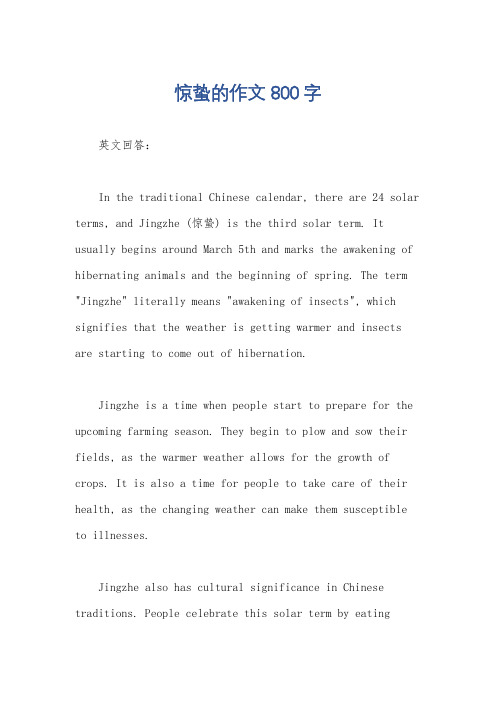
惊蛰的作文800字英文回答:In the traditional Chinese calendar, there are 24 solar terms, and Jingzhe (惊蛰) is the third solar term. It usually begins around March 5th and marks the awakening of hibernating animals and the beginning of spring. The term "Jingzhe" literally means "awakening of insects", which signifies that the weather is getting warmer and insects are starting to come out of hibernation.Jingzhe is a time when people start to prepare for the upcoming farming season. They begin to plow and sow their fields, as the warmer weather allows for the growth of crops. It is also a time for people to take care of their health, as the changing weather can make them susceptible to illnesses.Jingzhe also has cultural significance in Chinese traditions. People celebrate this solar term by eatingcertain foods that are believed to bring good luck and prosperity. For example, they may eat spring rolls, which symbolize the rolling away of the old and the welcoming of the new. There are also various customs and activities associated with Jingzhe, such as hanging up peach blossoms, writing spring couplets, and flying kites.中文回答:在中国传统的二十四节气中,惊蛰是第三个节气。
关于惊蛰节气的作文
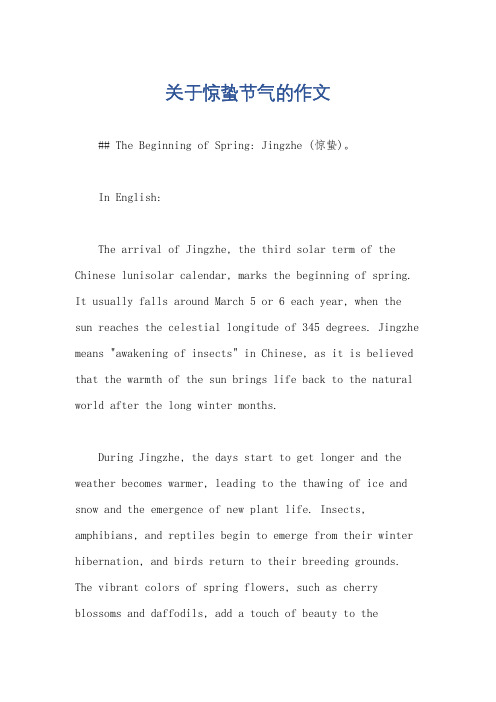
关于惊蛰节气的作文## The Beginning of Spring: Jingzhe (惊蛰)。
In English:The arrival of Jingzhe, the third solar term of the Chinese lunisolar calendar, marks the beginning of spring. It usually falls around March 5 or 6 each year, when the sun reaches the celestial longitude of 345 degrees. Jingzhe means "awakening of insects" in Chinese, as it is believed that the warmth of the sun brings life back to the natural world after the long winter months.During Jingzhe, the days start to get longer and the weather becomes warmer, leading to the thawing of ice and snow and the emergence of new plant life. Insects, amphibians, and reptiles begin to emerge from their winter hibernation, and birds return to their breeding grounds. The vibrant colors of spring flowers, such as cherry blossoms and daffodils, add a touch of beauty to thelandscape.Jingzhe is also a time of agricultural significance. Farmers prepare their fields for the upcoming planting season, and the traditional Chinese festival of Chunfen (Spring Equinox) falls within this period. Chunfen marksthe midpoint of spring, when day and night are of equal length. It is a time to celebrate the arrival of the new season and to pray for a bountiful harvest.In Chinese:惊蛰是二十四节气中的第三个节气,通常在每年3月5日或6日,当太阳到达黄经345度时。
介绍惊蛰英语作文带翻译
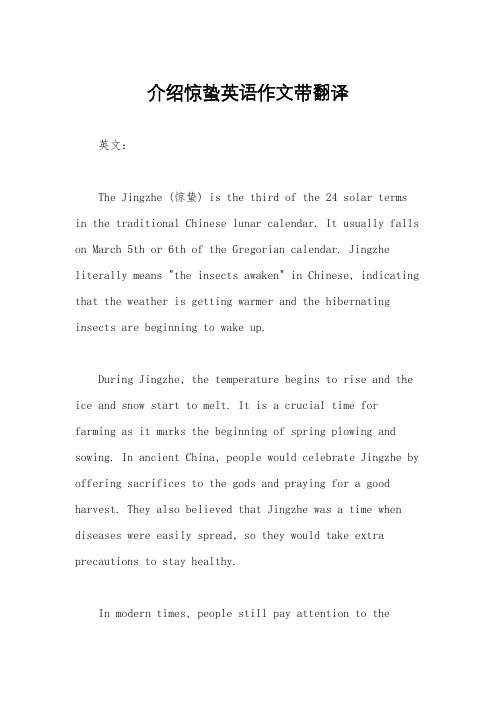
介绍惊蛰英语作文带翻译英文:The Jingzhe (惊蛰) is the third of the 24 solar terms in the traditional Chinese lunar calendar. It usually falls on March 5th or 6th of the Gregorian calendar. Jingzhe literally means "the insects awaken" in Chinese, indicating that the weather is getting warmer and the hibernating insects are beginning to wake up.During Jingzhe, the temperature begins to rise and the ice and snow start to melt. It is a crucial time for farming as it marks the beginning of spring plowing and sowing. In ancient China, people would celebrate Jingzhe by offering sacrifices to the gods and praying for a good harvest. They also believed that Jingzhe was a time when diseases were easily spread, so they would take extra precautions to stay healthy.In modern times, people still pay attention to thechanges in weather and adjust their daily routines accordingly. For example, during Jingzhe, people mightstart to wear lighter clothes and eat more fresh vegetables and fruits to adapt to the warmer weather. Some people also believe that Jingzhe is a good time to start new projectsor make important decisions, as it is seen as a time of new beginnings and growth.中文:惊蛰是中国传统农历二十四节气中的第三个节气,通常在公历3月5日或6日。
二十四节气惊蛰的英语作文
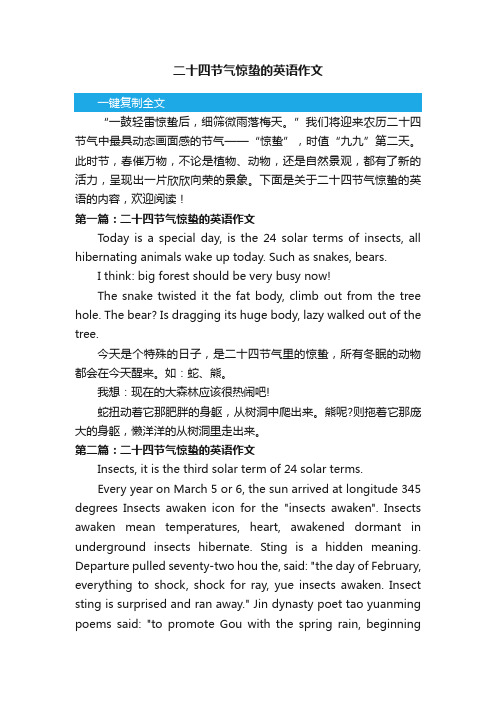
二十四节气惊蛰的英语作文“一鼓轻雷惊蛰后,细筛微雨落梅天。
”我们将迎来农历二十四节气中最具动态画面感的节气——“惊蛰”,时值“九九”第二天。
此时节,春催万物,不论是植物、动物,还是自然景观,都有了新的活力,呈现出一片欣欣向荣的景象。
下面是关于二十四节气惊蛰的英语的内容,欢迎阅读!第一篇:二十四节气惊蛰的英语作文Today is a special day, is the 24 solar terms of insects, all hibernating animals wake up today. Such as snakes, bears.I think: big forest should be very busy now!The snake twisted it the fat body, climb out from the tree hole. The bear? Is dragging its huge body, lazy walked out of the tree.今天是个特殊的日子,是二十四节气里的惊蛰,所有冬眠的动物都会在今天醒来。
如:蛇、熊。
我想:现在的大森林应该很热闹吧!蛇扭动着它那肥胖的身躯,从树洞中爬出来。
熊呢?则拖着它那庞大的身躯,懒洋洋的从树洞里走出来。
第二篇:二十四节气惊蛰的英语作文Insects, it is the third solar term of 24 solar terms.Every year on March 5 or 6, the sun arrived at longitude 345 degrees Insects awaken icon for the "insects awaken". Insects awaken mean temperatures, heart, awakened dormant in underground insects hibernate. Sting is a hidden meaning. Departure pulled seventy-two hou the, said: "the day of February, everything to shock, shock for ray, yue insects awaken. Insect sting is surprised and ran away." Jin dynasty poet tao yuanming poems said: "to promote Gou with the spring rain, beginningLeiFaDong corner, the sting of each dive, vegetation vertical and horizontal shu." In fact, the insects are hear thunder, the earth rejuvenation, weather warming is the end of hibernation, "surprised and ran away."惊蛰(jīng zhé),是24节气中的`第三个节气。
描写惊蛰的英语小作文
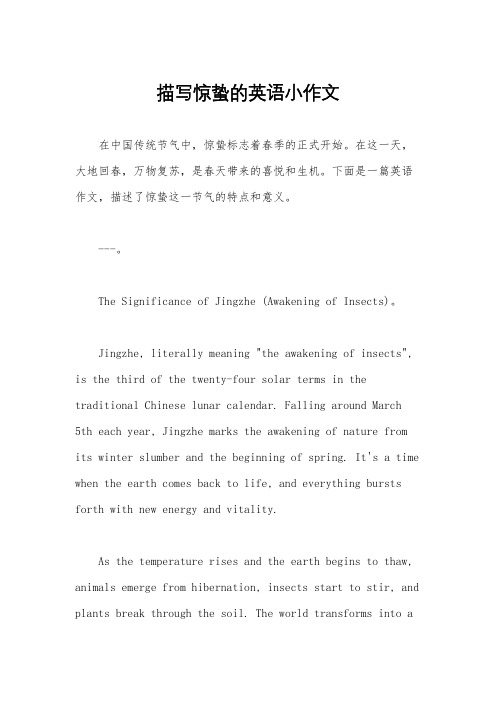
描写惊蛰的英语小作文在中国传统节气中,惊蛰标志着春季的正式开始。
在这一天,大地回春,万物复苏,是春天带来的喜悦和生机。
下面是一篇英语作文,描述了惊蛰这一节气的特点和意义。
---。
The Significance of Jingzhe (Awakening of Insects)。
Jingzhe, literally meaning "the awakening of insects", is the third of the twenty-four solar terms in the traditional Chinese lunar calendar. Falling around March5th each year, Jingzhe marks the awakening of nature from its winter slumber and the beginning of spring. It's a time when the earth comes back to life, and everything bursts forth with new energy and vitality.As the temperature rises and the earth begins to thaw, animals emerge from hibernation, insects start to stir, and plants break through the soil. The world transforms into avibrant tapestry of colors and sounds, as birds return from their winter migrations, flowers bloom, and trees sprout new leaves. It's a season of renewal and rejuvenation, symbolizing hope, growth, and new beginnings.In Chinese culture, Jingzhe is not only a time to celebrate the arrival of spring but also a time to take stock of one's life and set intentions for the coming year. It's believed that just as nature undergoes a process of rebirth during this time, so too can individuals undergo personal transformation and growth. People often take this opportunity to embark on new projects, pursue new goals, or make positive changes in their lives.Moreover, Jingzhe holds agricultural significance as well. It marks the crucial period for farmers to start planting crops and preparing their fields for the growing season ahead. Traditional wisdom dictates that during Jingzhe, farmers should pay close attention to the weather and soil conditions, ensuring optimal conditions for planting and nurturing their crops.In addition to its practical and symbolic significance, Jingzhe also holds a special place in Chinese folklore and literature. Countless poems, stories, and paintings have been inspired by the beauty and vitality of spring, capturing the essence of this magical time of year. From ancient myths about the awakening of the Earth Dragon to modern-day celebrations and rituals, Jingzhe continues to be a source of inspiration and wonder for people of all ages.In conclusion, Jingzhe is a time of great significance in Chinese culture, marking the arrival of spring and the awakening of nature from its winter slumber. It's a time of renewal, growth, and new beginnings, celebrated with joy and anticipation by people across the country. As we welcome the warm embrace of spring and embrace the opportunities for growth and transformation, let us remember the timeless wisdom of Jingzhe and the enduring spirit of renewal that it represents.---。
惊蛰为主题写一篇行动的英语作文
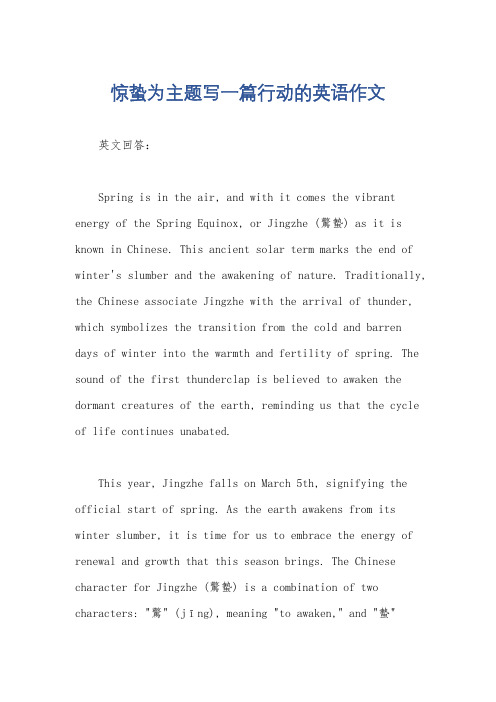
惊蛰为主题写一篇行动的英语作文英文回答:Spring is in the air, and with it comes the vibrant energy of the Spring Equinox, or Jingzhe (驚蟄) as it is known in Chinese. This ancient solar term marks the end of winter's slumber and the awakening of nature. Traditionally, the Chinese associate Jingzhe with the arrival of thunder, which symbolizes the transition from the cold and barren days of winter into the warmth and fertility of spring. The sound of the first thunderclap is believed to awaken the dormant creatures of the earth, reminding us that the cycle of life continues unabated.This year, Jingzhe falls on March 5th, signifying the official start of spring. As the earth awakens from its winter slumber, it is time for us to embrace the energy of renewal and growth that this season brings. The Chinese character for Jingzhe (驚蟄) is a combination of two characters: "驚" (jīng), meaning "to awaken," and "蟄"(zhé), meaning "to hibernate." This term captures the essence of the transition from stillness to activity, from dormancy to flourishing.In Chinese culture, Jingzhe is associated with a number of customs and traditions. One common practice is to eat spring pancakes (春饼), a thin crepe-like dish typically filled with vegetables and meat. These pancakes symbolize the rejuvenation of nature and the breaking free from the confines of winter. Another tradition is to hang paper butterflies around the house, representing the butterflies that emerge from their cocoons with the arrival of spring. These butterflies symbolize transformation, beauty, and the joy of new life.The energy of Jingzhe invites us to reflect on our own lives and to consider the ways in which we can awaken our dormant potential and embrace new beginnings. This is a time to shed the heaviness of the past and to step into the lightness and brightness of the future. It is a time to embrace change and to welcome the opportunities that come our way.As we celebrate Jingzhe, let us remember the transformative power of nature and the indomitable spiritof life that persists through the seasons. Let us channel the energy of this vibrant solar term to ignite our own passions, to pursue our dreams, and to create a futurefilled with growth, abundance, and joy.中文回答:惊蛰,又称“春雷”,是二十四节气中的第三个节气,也是春季的开始。
关于惊蛰的英语介绍作文
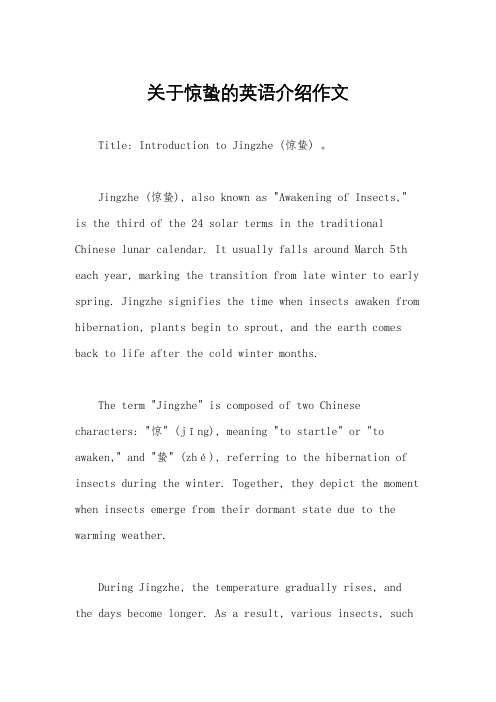
关于惊蛰的英语介绍作文Title: Introduction to Jingzhe (惊蛰) 。
Jingzhe (惊蛰), also known as "Awakening of Insects,"is the third of the 24 solar terms in the traditional Chinese lunar calendar. It usually falls around March 5th each year, marking the transition from late winter to early spring. Jingzhe signifies the time when insects awaken from hibernation, plants begin to sprout, and the earth comes back to life after the cold winter months.The term "Jingzhe" is composed of two Chinese characters: "惊" (jīng), meaning "to startle" or "to awaken," and "蛰" (zhé), referring to the hibernation of insects during the winter. Together, they depict the moment when insects emerge from their dormant state due to the warming weather.During Jingzhe, the temperature gradually rises, and the days become longer. As a result, various insects, suchas butterflies, bees, and ants, start to become active again. This period marks a crucial time for agricultural activities as farmers prepare their fields for planting.It's a time of renewal and rejuvenation in nature, symbolizing the beginning of a new cycle of life.In traditional Chinese culture, Jingzhe is associated with the belief that the balance between yin and yang energies shifts during this time. According to ancient Chinese philosophy, yin represents darkness, coldness, and dormancy, while yang symbolizes light, warmth, and activity. Jingzhe marks the transition when yang energy begins to dominate over yin, bringing about the awakening of life.People celebrate Jingzhe in various ways, including:1. Spring Cleaning: Jingzhe is a time for thorough cleaning and tidying up homes to welcome the arrival of spring. It's believed that cleaning during this period can sweep away any lingering bad luck from the previous yearand invite good fortune into the household.2. Planting: With the arrival of warmer weather, farmers start planting crops such as wheat, barley, and rapeseed. This is a busy time in agricultural communities as they prepare the fields and sow seeds for the upcoming growing season.3. Enjoying Spring Scenery: Many people take the opportunity to go outdoors and appreciate the beauty of nature in bloom. Parks, gardens, and countryside areas become popular destinations for leisurely strolls and picnics.4. Eating Seasonal Foods: Traditional Chinese cuisine often incorporates seasonal ingredients, and Jingzhe is no exception. People enjoy dishes made with fresh spring vegetables and herbs, such as bamboo shoots, spinach, and shepherd's purse.5. Traditional Customs: Some regions have specific customs and rituals associated with Jingzhe, such as hanging up red paper lanterns or setting off firecrackers to ward off evil spirits and bring blessings for the newseason.Overall, Jingzhe holds significant cultural and agricultural importance in Chinese society. It's a time of transition, growth, and optimism as people welcome the arrival of spring and the opportunities it brings for new beginnings. Through its rich customs and traditions, Jingzhe reflects the deep connection between humans and the natural world, reminding us of the cyclical nature of life and the constant renewal of the seasons.。
惊蛰作文800字开头
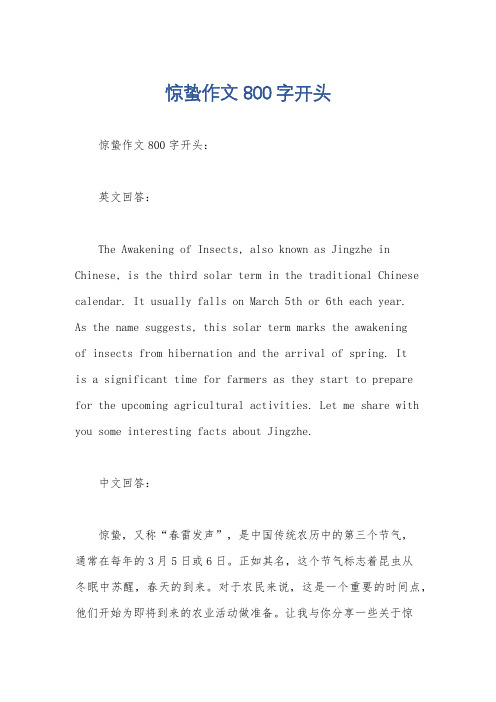
惊蛰作文800字开头惊蛰作文800字开头:英文回答:The Awakening of Insects, also known as Jingzhe in Chinese, is the third solar term in the traditional Chinese calendar. It usually falls on March 5th or 6th each year.As the name suggests, this solar term marks the awakeningof insects from hibernation and the arrival of spring. Itis a significant time for farmers as they start to prepare for the upcoming agricultural activities. Let me share with you some interesting facts about Jingzhe.中文回答:惊蛰,又称“春雷发声”,是中国传统农历中的第三个节气,通常在每年的3月5日或6日。
正如其名,这个节气标志着昆虫从冬眠中苏醒,春天的到来。
对于农民来说,这是一个重要的时间点,他们开始为即将到来的农业活动做准备。
让我与你分享一些关于惊蛰的有趣事实。
英文回答:During Jingzhe, the weather starts to warm up and the temperature rises. As a result, insects that have been in hibernation begin to emerge from their hiding places. This includes various insects such as bees, butterflies, and ladybugs. Farmers see this as a positive sign, as it indicates that the land is becoming more fertile andsuitable for planting crops.中文回答:在惊蛰期间,天气开始变暖,温度上升。
惊蛰的英语作文
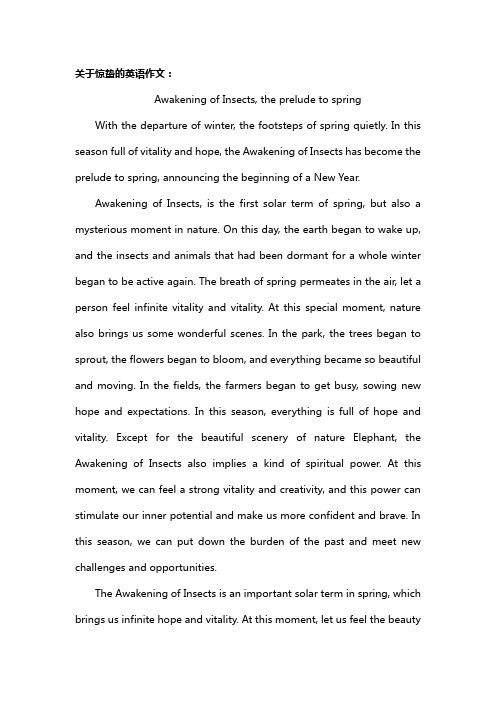
关于惊蛰的英语作文:Awakening of Insects, the prelude to spring With the departure of winter, the footsteps of spring quietly. In this season full of vitality and hope, the Awakening of Insects has become the prelude to spring, announcing the beginning of a New Year.Awakening of Insects, is the first solar term of spring, but also a mysterious moment in nature. On this day, the earth began to wake up, and the insects and animals that had been dormant for a whole winter began to be active again. The breath of spring permeates in the air, let a person feel infinite vitality and vitality. At this special moment, nature also brings us some wonderful scenes. In the park, the trees began to sprout, the flowers began to bloom, and everything became so beautiful and moving. In the fields, the farmers began to get busy, sowing new hope and expectations. In this season, everything is full of hope and vitality. Except for the beautiful scenery of nature Elephant, the Awakening of Insects also implies a kind of spiritual power. At this moment, we can feel a strong vitality and creativity, and this power can stimulate our inner potential and make us more confident and brave. In this season, we can put down the burden of the past and meet new challenges and opportunities.The Awakening of Insects is an important solar term in spring, which brings us infinite hope and vitality. At this moment, let us feel the beautyand power of nature together, meet new challenges and opportunities, and inject more vitality and power into our own life.中文译文:惊蛰,春天的序曲随着冬日的离去,春天的脚步悄然来临。
关于惊蛰的来历英语作文
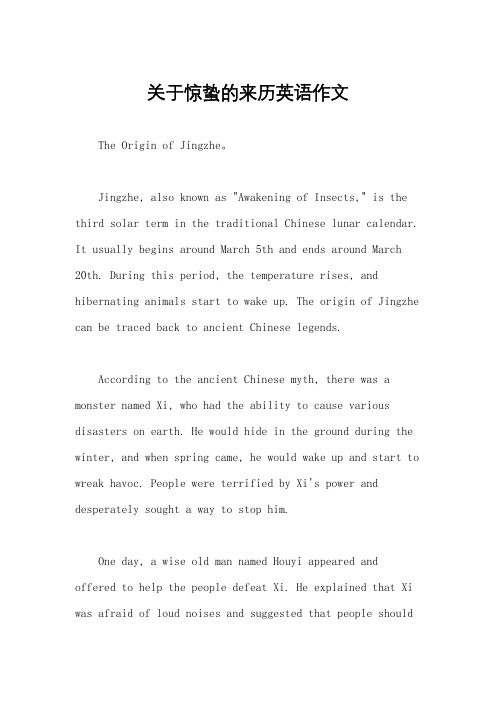
关于惊蛰的来历英语作文The Origin of Jingzhe。
Jingzhe, also known as "Awakening of Insects," is the third solar term in the traditional Chinese lunar calendar. It usually begins around March 5th and ends around March20th. During this period, the temperature rises, and hibernating animals start to wake up. The origin of Jingzhe can be traced back to ancient Chinese legends.According to the ancient Chinese myth, there was a monster named Xi, who had the ability to cause various disasters on earth. He would hide in the ground during the winter, and when spring came, he would wake up and start to wreak havoc. People were terrified by Xi's power and desperately sought a way to stop him.One day, a wise old man named Houyi appeared and offered to help the people defeat Xi. He explained that Xi was afraid of loud noises and suggested that people shouldmake as much noise as possible to scare him away. The people followed Houyi's advice and started to beat drums, gongs, and other instruments to create a deafening sound. The noise frightened Xi, and he fled into the mountains, never to be seen again.To commemorate this event, the ancient Chinese people decided to establish the solar term "Jingzhe" to celebrate the awakening of insects and the arrival of spring. They believed that the loud noises made during this period would drive away evil spirits and bring good luck for the year ahead.Since then, the tradition of celebrating Jingzhe has been passed down from generation to generation. People would gather together and participate in various activities to welcome the arrival of spring. They would set off firecrackers, beat drums, and perform lion dances to create a festive atmosphere. It is believed that these activities would not only scare away evil spirits but also bring good fortune and prosperity.In modern times, the celebration of Jingzhe has evolved into a cultural event that showcases the rich heritage of Chinese traditions. People still engage in variousactivities to celebrate the awakening of insects, such as flying kites, planting trees, and enjoying the blooming flowers. These activities not only bring joy and happiness to people's lives but also serve as a reminder of the importance of protecting the environment.In conclusion, the origin of Jingzhe can be traced back to ancient Chinese legends. It is a solar term that celebrates the awakening of insects and the arrival of spring. The tradition of celebrating Jingzhe has been passed down for centuries and continues to be an important cultural event in China. It reminds people of the power of unity and the importance of preserving nature.。
惊蛰记事作文
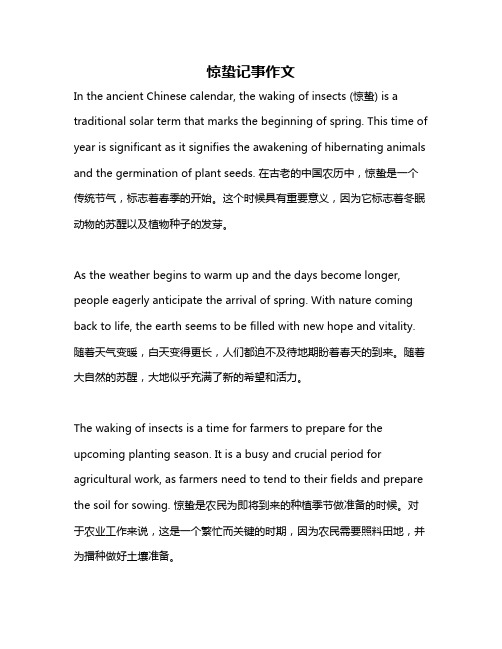
惊蛰记事作文In the ancient Chinese calendar, the waking of insects (惊蛰) is a traditional solar term that marks the beginning of spring. This time of year is significant as it signifies the awakening of hibernating animals and the germination of plant seeds. 在古老的中国农历中,惊蛰是一个传统节气,标志着春季的开始。
这个时候具有重要意义,因为它标志着冬眠动物的苏醒以及植物种子的发芽。
As the weather begins to warm up and the days become longer, people eagerly anticipate the arrival of spring. With nature coming back to life, the earth seems to be filled with new hope and vitality. 随着天气变暖,白天变得更长,人们都迫不及待地期盼着春天的到来。
随着大自然的苏醒,大地似乎充满了新的希望和活力。
The waking of insects is a time for farmers to prepare for the upcoming planting season. It is a busy and crucial period for agricultural work, as farmers need to tend to their fields and prepare the soil for sowing. 惊蛰是农民为即将到来的种植季节做准备的时候。
对于农业工作来说,这是一个繁忙而关键的时期,因为农民需要照料田地,并为播种做好土壤准备。
惊蛰的英语作文
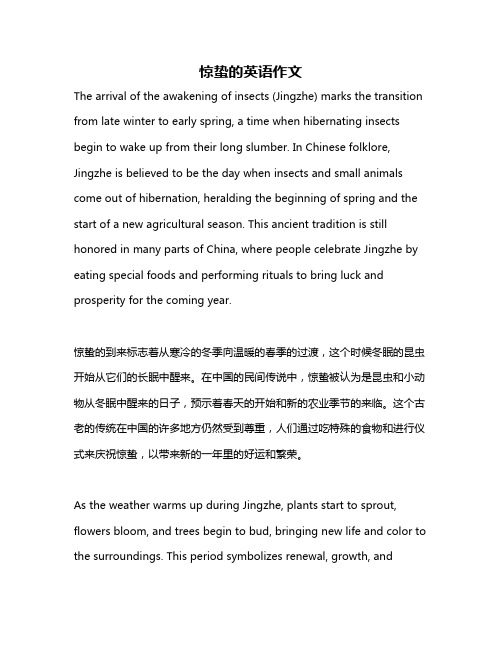
惊蛰的英语作文The arrival of the awakening of insects (Jingzhe) marks the transition from late winter to early spring, a time when hibernating insects begin to wake up from their long slumber. In Chinese folklore, Jingzhe is believed to be the day when insects and small animals come out of hibernation, heralding the beginning of spring and the start of a new agricultural season. This ancient tradition is still honored in many parts of China, where people celebrate Jingzhe by eating special foods and performing rituals to bring luck and prosperity for the coming year.惊蛰的到来标志着从寒冷的冬季向温暖的春季的过渡,这个时候冬眠的昆虫开始从它们的长眠中醒来。
在中国的民间传说中,惊蛰被认为是昆虫和小动物从冬眠中醒来的日子,预示着春天的开始和新的农业季节的来临。
这个古老的传统在中国的许多地方仍然受到尊重,人们通过吃特殊的食物和进行仪式来庆祝惊蛰,以带来新的一年里的好运和繁荣。
As the weather warms up during Jingzhe, plants start to sprout, flowers bloom, and trees begin to bud, bringing new life and color to the surroundings. This period symbolizes renewal, growth, andrejuvenation, inspiring a sense of hope and optimism after the long winter months. People often take this opportunity to clean their homes, repair any damages, and prepare their fields for planting, embracing the energy of spring and the promise of abundance in the coming season.随着惊蛰期间天气的变暖,植物开始发芽,花朵盛开,树木开始发芽,给周围带来新的生机和色彩。
以惊蛰为话题写一篇作文
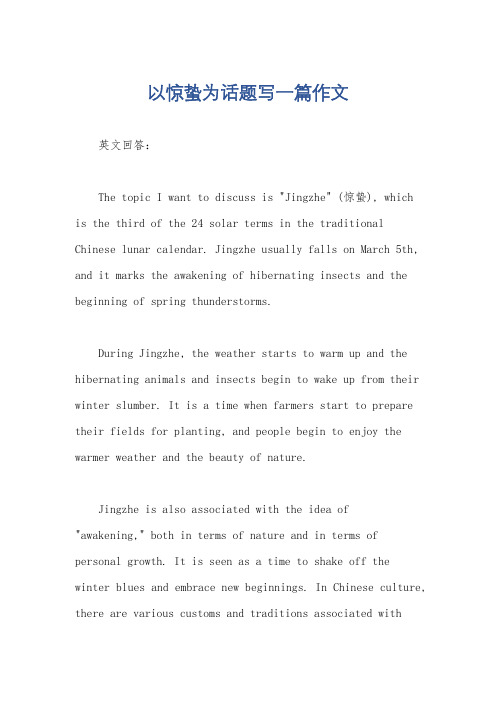
以惊蛰为话题写一篇作文英文回答:The topic I want to discuss is "Jingzhe" (惊蛰), whichis the third of the 24 solar terms in the traditional Chinese lunar calendar. Jingzhe usually falls on March 5th, and it marks the awakening of hibernating insects and the beginning of spring thunderstorms.During Jingzhe, the weather starts to warm up and the hibernating animals and insects begin to wake up from their winter slumber. It is a time when farmers start to prepare their fields for planting, and people begin to enjoy the warmer weather and the beauty of nature.Jingzhe is also associated with the idea of "awakening," both in terms of nature and in terms of personal growth. It is seen as a time to shake off thewinter blues and embrace new beginnings. In Chinese culture, there are various customs and traditions associated withJingzhe, such as eating certain foods and performing rituals to welcome the arrival of spring.中文回答:惊蛰是中国传统二十四节气中的第三个节气,通常在3月5日左右。
五年级英语下册 关于惊蛰的作文
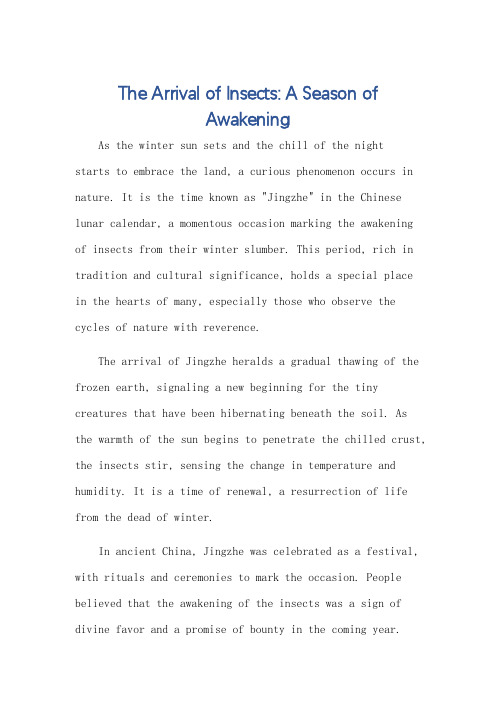
The Arrival of Insects: A Season ofAwakeningAs the winter sun sets and the chill of the nightstarts to embrace the land, a curious phenomenon occurs in nature. It is the time known as "Jingzhe" in the Chinese lunar calendar, a momentous occasion marking the awakeningof insects from their winter slumber. This period, rich in tradition and cultural significance, holds a special placein the hearts of many, especially those who observe the cycles of nature with reverence.The arrival of Jingzhe heralds a gradual thawing of the frozen earth, signaling a new beginning for the tiny creatures that have been hibernating beneath the soil. As the warmth of the sun begins to penetrate the chilled crust, the insects stir, sensing the change in temperature and humidity. It is a time of renewal, a resurrection of life from the dead of winter.In ancient China, Jingzhe was celebrated as a festival, with rituals and ceremonies to mark the occasion. People believed that the awakening of the insects was a sign of divine favor and a promise of bounty in the coming year.Farmers would pray for a plentiful harvest, hoping that the new life emerging from the soil would bring prosperity and fertility to their fields.Today, while the festival celebrations may have wanedin some parts of China, the significance of Jingzhe remains. It serves as a reminder of the interconnectedness of alllife and the delicate balance of nature. It is a time to appreciate the resilience and adaptability of the insects, who, despite the harshness of winter, manage to survive and thrive in the spring.Moreover, Jingzhe is a time for reflection. It encourages us to consider our own lives and the ways we adapt to change. Just as the insects emerge from their cocoons to greet the new season, we can also emerge fromour own challenges and difficulties, refreshed and ready to face the world anew.The beauty of Jingzhe lies not only in the literal awakening of the insects but also in the metaphorical resurrection of hope and optimism. It is a reminder that no matter how bleak the winter may seem, there is always the promise of spring and new beginnings waiting in the wings.In conclusion, Jingzhe is not just a day on the calendar; it is a symbol of renewal and rebirth. It teaches us to embrace change, to find hope in the face of adversity, and to appreciate the small miracles of life that occur every day. As we mark this special day, let us also remember to cherish the cycles of nature and the wonders it brings to our world.**惊蛰:唤醒生命的季节**当冬日的夕阳落下,寒夜开始拥抱大地时,自然界中发生了一个奇特的现象。
惊蛰的英语作文三年级
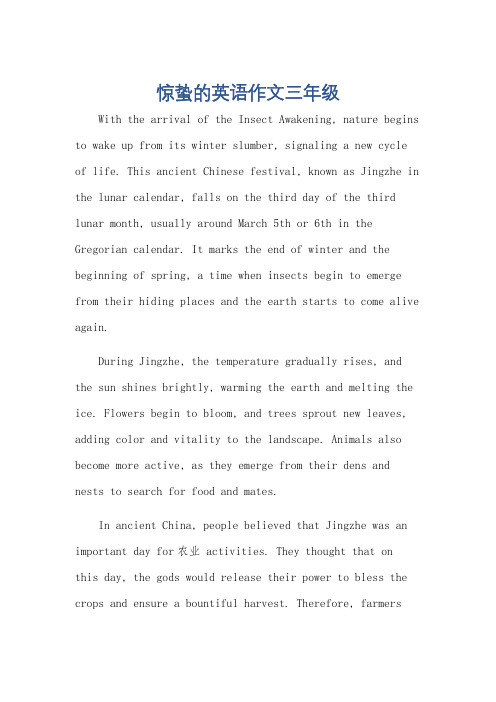
惊蛰的英语作文三年级With the arrival of the Insect Awakening, nature begins to wake up from its winter slumber, signaling a new cycle of life. This ancient Chinese festival, known as Jingzhe in the lunar calendar, falls on the third day of the third lunar month, usually around March 5th or 6th in the Gregorian calendar. It marks the end of winter and the beginning of spring, a time when insects begin to emerge from their hiding places and the earth starts to come alive again.During Jingzhe, the temperature gradually rises, and the sun shines brightly, warming the earth and melting the ice. Flowers begin to bloom, and trees sprout new leaves, adding color and vitality to the landscape. Animals also become more active, as they emerge from their dens and nests to search for food and mates.In ancient China, people believed that Jingzhe was an important day for农业 activities. They thought that onthis day, the gods would release their power to bless the crops and ensure a bountiful harvest. Therefore, farmerswould often hold sacrifices to pray for a good harvest and ask the gods to protect their crops from pests and diseases. Apart from agricultural significance, Jingzhe also has cultural and historical values. In ancient times, people would hold various activities to celebrate this festival, such as flying kites, playing ball games, and eatingspecial foods. These traditions have been carried down through the generations and have become an important partof Chinese culture.Flying kites is a popular activity during Jingzhe. People believe that flying kites can help them release negative energy and bring good luck. They also believe that the higher the kite flies, the more blessings they will receive. Therefore, on Jingzhe day, people can be seenflying kites in parks and open spaces, enjoying the freshair and the beauty of nature.Playing ball games is another traditional activity during Jingzhe. This is believed to help strengthen thebody and promote health. Ancient Chinese believed that playing ball games could also bring good luck and ward off evil spirits. Therefore, people would often gather togetherto play ball games on Jingzhe day, laughing and chatting while exercising.Eating special foods is also a common custom during Jingzhe. In some regions, people would eat beans or bean sprouts on this day, as they believe that beans symbolize new life and growth. In other regions, people would eat spring rolls or dumplings filled with vegetables and meats, symbolizing the beginning of a new season and the hope fora prosperous year.In conclusion, Jingzhe is not only an importantfestival in the Chinese lunar calendar but also a symbol of the beginning of a new season and a time for new beginnings. It reminds us that life is constantly changing and growing, and that we should appreciate the beauty and wonders of nature while working hard to achieve our goals. Let us embrace Jingzhe with open arms and celebrate the beauty and meaning of this special day.**惊蛰的魅力与意义**惊蛰的到来,标志着大自然从冬日的沉睡中苏醒,预示着生命的新一轮循环。
哪天是惊蛰的英语作文
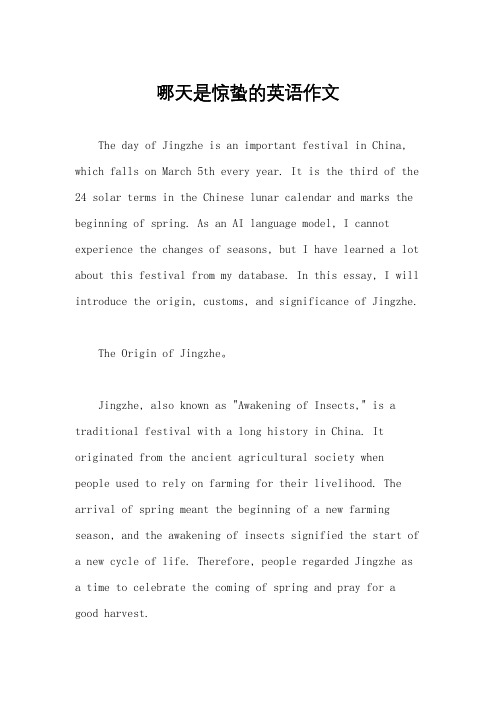
哪天是惊蛰的英语作文The day of Jingzhe is an important festival in China, which falls on March 5th every year. It is the third of the 24 solar terms in the Chinese lunar calendar and marks the beginning of spring. As an AI language model, I cannot experience the changes of seasons, but I have learned a lot about this festival from my database. In this essay, I will introduce the origin, customs, and significance of Jingzhe.The Origin of Jingzhe。
Jingzhe, also known as "Awakening of Insects," is a traditional festival with a long history in China. It originated from the ancient agricultural society when people used to rely on farming for their livelihood. The arrival of spring meant the beginning of a new farming season, and the awakening of insects signified the start of a new cycle of life. Therefore, people regarded Jingzhe as a time to celebrate the coming of spring and pray for a good harvest.Customs of Jingzhe。
联系惊蛰写一篇作文
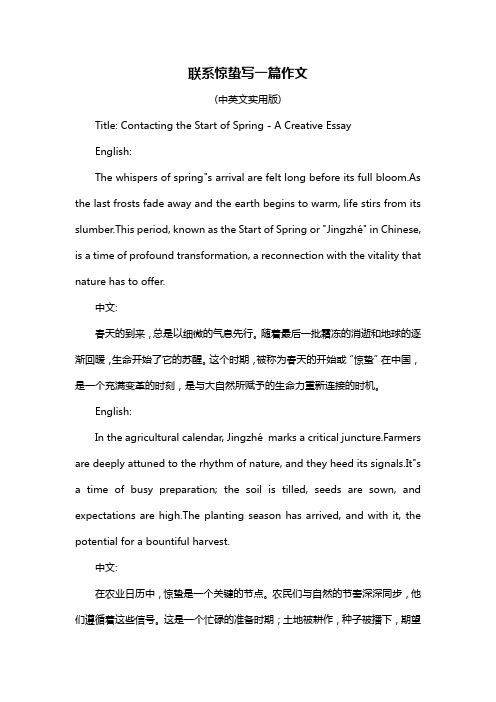
联系惊蛰写一篇作文(中英文实用版)Title: Contacting the Start of Spring - A Creative EssayEnglish:The whispers of spring"s arrival are felt long before its full bloom.As the last frosts fade away and the earth begins to warm, life stirs from its slumber.This period, known as the Start of Spring or "Jingzhé" in Chinese, is a time of profound transformation, a reconnection with the vitality that nature has to offer.中文:春天的到来,总是以细微的气息先行。
随着最后一批霜冻的消逝和地球的逐渐回暖,生命开始了它的苏醒。
这个时期,被称为春天的开始或“惊蛰”在中国,是一个充满变革的时刻,是与大自然所赋予的生命力重新连接的时机。
English:In the agricultural calendar, Jingzhémarks a critical juncture.Farmers are deeply attuned to the rhythm of nature, and they heed its signals.It"s a time of busy preparation; the soil is tilled, seeds are sown, and expectations are high.The planting season has arrived, and with it, the potential for a bountiful harvest.中文:在农业日历中,惊蛰是一个关键的节点。
关于惊蛰的英语作文范文800字带翻译
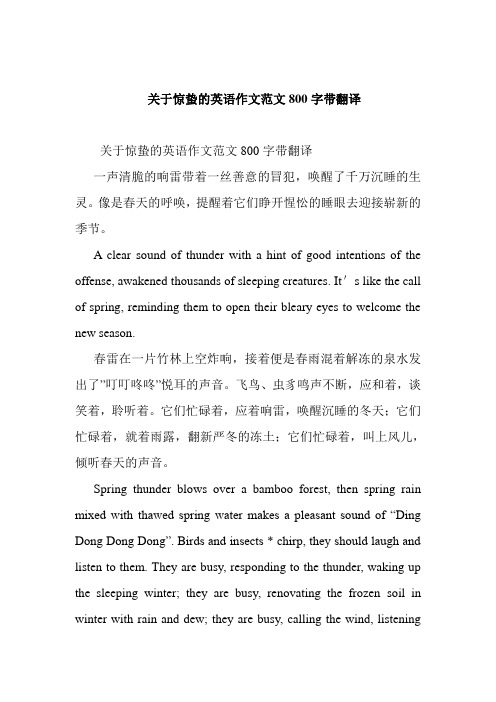
关于惊蛰的英语作文范文800字带翻译关于惊蛰的英语作文范文800字带翻译一声清脆的响雷带着一丝善意的冒犯,唤醒了千万沉睡的生灵。
像是春天的呼唤,提醒着它们睁开惺忪的睡眼去迎接崭新的季节。
A clear sound of thunder with a hint of good intentions of the offense, awakened thousands of sleeping creatures. It's like the call of spring, reminding them to open their bleary eyes to welcome the new season.春雷在一片竹林上空炸响,接着便是春雨混着解冻的泉水发出了”叮叮咚咚”悦耳的声音。
飞鸟、虫豸鸣声不断,应和着,谈笑着,聆听着。
它们忙碌着,应着响雷,唤醒沉睡的冬天;它们忙碌着,就着雨露,翻新严冬的冻土;它们忙碌着,叫上风儿,倾听春天的声音。
Spring thunder blows over a bamboo forest, then spring rain mixed with thawed spring water makes a pleasant sound of “Ding Dong Dong Dong”. Birds and insects * chirp, they should laugh and listen to them. They are busy, responding to the thunder, waking up the sleeping winter; they are busy, renovating the frozen soil in winter with rain and dew; they are busy, calling the wind, listeningto the sound of spring.一抹抹绒绒新绿被惊醒了,逃到柳尖,涌入大地,跃上枝丫。
- 1、下载文档前请自行甄别文档内容的完整性,平台不提供额外的编辑、内容补充、找答案等附加服务。
- 2、"仅部分预览"的文档,不可在线预览部分如存在完整性等问题,可反馈申请退款(可完整预览的文档不适用该条件!)。
- 3、如文档侵犯您的权益,请联系客服反馈,我们会尽快为您处理(人工客服工作时间:9:00-18:30)。
关于惊蛰的英语作文范文800字带翻译
关于惊蛰的英语作文范文800字带翻译
一声清脆的响雷带着一丝善意的冒犯,唤醒了千万沉睡的生灵。
像是春天的呼唤,提醒着它们睁开惺忪的睡眼去迎接崭新的季节。
A clear sound of thunder with a hint of good intentions of the offense, awakened thousands of sleeping creatures. It's like the call of spring, reminding them to open their bleary eyes to welcome the new season.
春雷在一片竹林上空炸响,接着便是春雨混着解冻的泉水发出了”叮叮咚咚”悦耳的声音。
飞鸟、虫豸鸣声不断,应和着,谈笑着,聆听着。
它们忙碌着,应着响雷,唤醒沉睡的冬天;它们忙碌着,就着雨露,翻新严冬的冻土;它们忙碌着,叫上风儿,倾听春天的声音。
Spring thunder blows over a bamboo forest, then spring rain mixed with thawed spring water makes a pleasant sound of “Ding Dong Dong Dong”. Birds and insects * chirp, they should laugh and listen to them. They are busy, responding to the thunder, waking up the sleeping winter; they are busy, renovating the frozen soil in winter with rain and dew; they are busy, calling the wind, listening
to the sound of spring.
一抹抹绒绒新绿被惊醒了,逃到柳尖,涌入大地,跃上枝丫。
它们带着鲜艳的的笑脸,瞬间让大地换上了另一种外衣,春天的气息就在这中间变得更加清晰。
桃花、杏花争先恐后地应着攀升的气温,纷纷绽放了笑脸,幽幽的花香吸引了路人来驻足,拍照或者观赏,却都是满含笑意地爱护着这春色。
天空有了别样的色彩,蓝的透明、清澈,更将这春日的阳光映衬的无比灿烂。
空气中的寒冷终于藏了起来,流露出雨后的芬芳,小鸟开始展翅,沐浴在阳光下的艳丽的羽毛在这池塘里画出了生命的精彩。
大地在春雷声中醒了,用雨洗了脸,满是自然的芳香,满是春天的活力。
A touch of new green fluffy was awakened, fled to Liujian, poured into the earth, jumped on the branches. With their bright smiling faces, they instantly changed the earth into another kind of coat, and the breath of spring became clearer in the middle. Peach blossom and apricot blossom are competing with each other in response to the rising temperature, and smiling faces are blooming one after another. The faint fragrance of flowers attracts passers-by to stop, take photos or watch, but they love the spring color with full smile. The sky has different colors. The blue is transparent and clear, which sets off the brilliant sunshine in spring. The cold in the air finally hid, showing the fragrance after the rain. The birds began to spread their wings, and the gorgeous feathers bathed in the sun
painted the wonderful life in this pond. The earth woke up in the sound of spring thunder, washed its face with rain, full of natural fragrance, full of spring vitality.
一只小虫刚刚被雷声唤醒,刚睁开眼睛就嗅到了春天的气息,新鲜、活力、沁人心脾。
它没有犹豫一口咬下那旁边的嫩绿,柔软、芳香、多汁,立刻变得生龙活虎起来,它轻快的身姿像是为这春天的到来而欢呼雀跃。
这就是被惊蛰唤醒了的春天的味道,不再干枯、不再生硬,而是无尽的鲜嫩、美味。
A bug has just been awakened by the thunder, just opened his eyes and smelled the breath of spring, fresh, energetic and refreshing. It did not hesitate to take a bite of the next green, soft, fragrant, juicy, and immediately became lively, its brisk posture seems to be cheering for the arrival of this spring. This is the taste of spring awakened by Jingzhe. It is no longer dry and hard, but endless fresh and delicious.
一个顽皮的孩子在听到春雷后,按耐不住自己,他惊呼:”春天来啦,打雷下雨啦!”他跑出去,伸出双手触摸暖的空气,抬起头仰望蓝的天空,深呼吸感受着滋润的空气。
他奔跑着去拥抱这个季节,却一个不留神摔倒了,小草与泥土给了他一个温柔的拥抱,轻轻对他说:”这就是惊蛰后的春天,松软、温暖。
”于是,他开心地笑了。
A naughty child can't bear to hear Chunlei. He exclaimed:
“spring is coming, thunder is raining!”! “He ran out, reached out his hands to touch the warm air, looked up at the blue sky, and took a deep breath to feel the moist air. He ran to embrace the season, but one fell down, grass and soil gave him a gentle hug, gently said to him: “this is the spring after hibernation, soft and warm. “So he smiled happily.
惊蛰,世间万物都是可爱的姿态、新生的活力、苏醒的欢乐、上升的气息,像一座刚刚午休过的幼儿园,充满了生命的活力。
”惊蛰过,暖和和”,而春天终于在大地上展开了属于自己的的时代。
All things in the world are lovely gestures, new vitality, reviving joy and rising breath, like a kindergarten just after lunch break, full of vitality of life. “After hibernating, it is warm”, and spring has finally launched its own era on the earth.。
